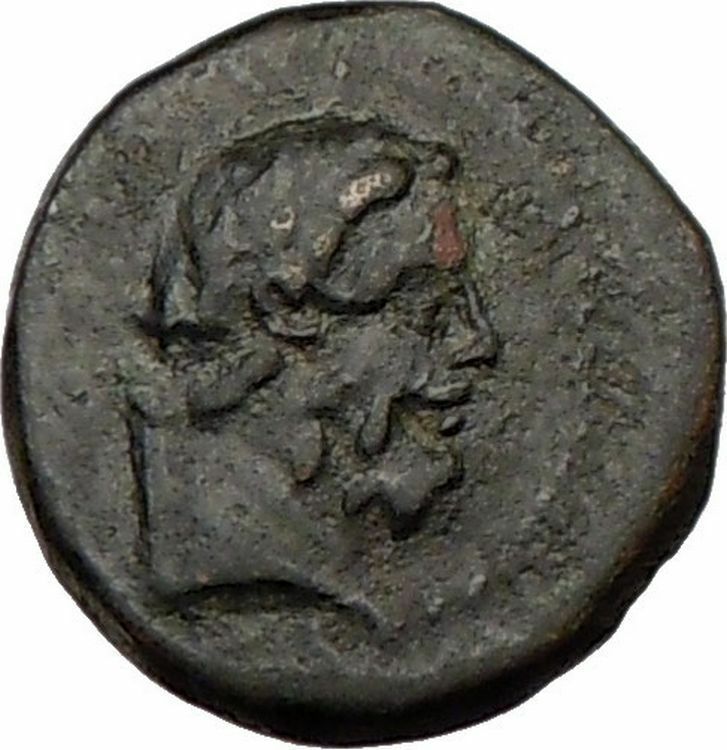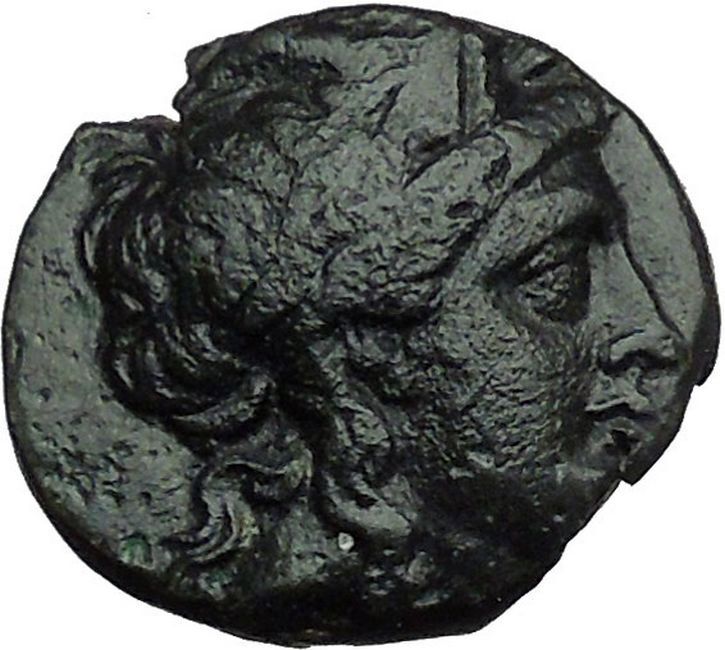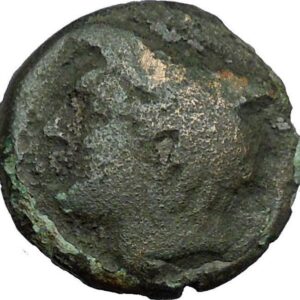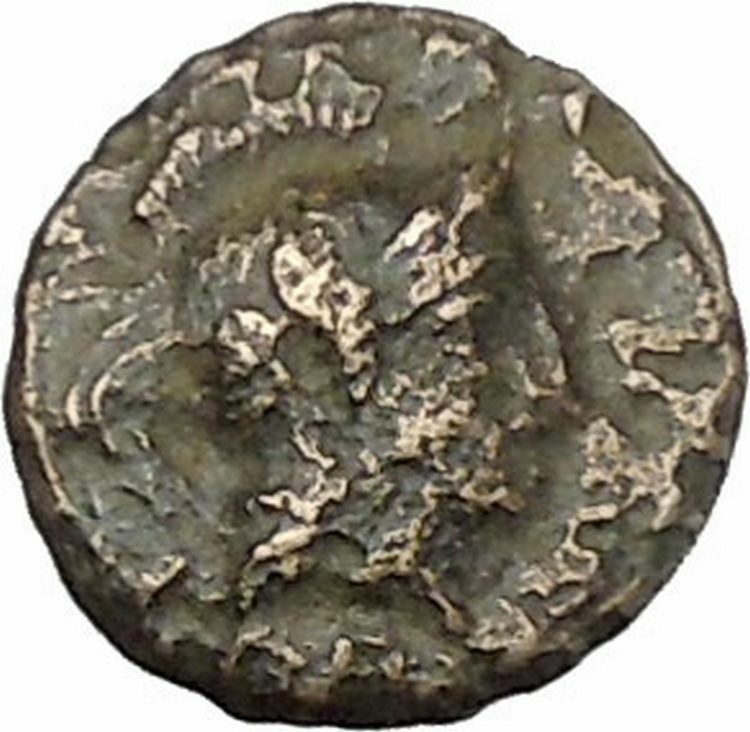|
Greek Kingdom of Thrace
Rhoemetalkes – King: 11 B.C – 12 A.D.
Bronze 16mm (2.83 grams) Struck 11 B.C – 12 A.D.
Reference: RPC I 1704
ΣEBAΣTOY; fasces and Capricorn.
POIMHTAΛKOY; sella curulis (throne) and scepter.
The Capricorn is the zodiacal sign of Augustus and the sella curulis and a spear symbolize Roman power. Youroukova posited that this type was struck circa 11 B.C. when coming on the throne and receiving the symbols of power from Augustus.
Thrace did not become a Roman province until the reign of Claudius (A.D. 46). Augustus created Rhoemetalkes I ruler of the whole of Thrace in 11 B.C. and he governed the country well for almost a quarter of a century until his death in A.D. 12. Thereafter the Kingdom had a troubled history culminating in the murder, by his wife, of the last ruler Rhoemetalkes III.
Son of Kotys and Sapaean, Rhoemetalkes had a long political career in the earlier part of which he acted as the guardian of the children of Kotys III. He became King of Thrace in 11 B.C. and remained a loyal ally of the Romans throughout his reign.
You are bidding on the exact item pictured, provided with a Certificate of Authenticity and Lifetime Guarantee of Authenticity.
 Capricorn (♑) is the tenth astrological sign in the zodiac, originating from the constellation of Capricornus. It spans the 270-300th degree of the zodiac, corresponding to celestial longitude. Capricorn is ruled by the planet Saturn. Under the tropical zodiac, the sun transits this area from December 22 to January 19 each year, and under the sidereal zodiac, the sun currently transits the constellation of Capricorn from approximately January 15 to February 14. In astrology, Capricorn is considered an earth sign, introvert sign, and one of the four cardinal signs. Capricorn (♑) is the tenth astrological sign in the zodiac, originating from the constellation of Capricornus. It spans the 270-300th degree of the zodiac, corresponding to celestial longitude. Capricorn is ruled by the planet Saturn. Under the tropical zodiac, the sun transits this area from December 22 to January 19 each year, and under the sidereal zodiac, the sun currently transits the constellation of Capricorn from approximately January 15 to February 14. In astrology, Capricorn is considered an earth sign, introvert sign, and one of the four cardinal signs.
Zodiac symbol Goat Duration (tropical, western) 22 December – 20 January (2014, UTC) Constellation Capricornus Zodiac element Earth Zodiac quality Cardinal Sign ruler Saturn Detriment Moon Exaltation Mars Fall Jupiter
Capricorn-Sagittarius cusps (those born from December 22 to December 28) are considered to be slightly different from the typical Capricorn, being more outgoing, jovial and less ambitious and money-orientated than the Capricorn who is not born on a cusp.
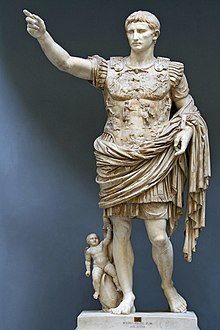 Augustus – Roman Emperor: 27 B.C. – 14 A.D. Augustus – Roman Emperor: 27 B.C. – 14 A.D.
| As Octavian: Member of Second Triumvirite, 43-33 B.C. | As Octavian, Imperator, 31-27 B.C. | As Augustus 27 B.C. – 14 A.D. |
| Grand-nephew and adopted son of Julius Caesar | Husband of Scribonia and Livia | Father of Julia (by Scribonia) | Brother of Octavia | Brother-in-law of Mark Antony | Father-in-law of Marcellus, Agrippa and Tiberius | Adoptive father of Tiberius and Nero Claudius Drusus | Uncle of Antonia | Grand-uncle of Germanicus, Claudius and Livilla | Grandfather of Gaius Caesar, Lucius Caesar, Agrippa Postumus, Julia the Younger and Agrippina Senior | Great-grandfather of Nero Caesar, Drusus Caesar, Caligula, Agrippina Junior, Drusilla and Julia Livilla | Great-great-grandfather of Nero |
Augustus (Latin: Imperātor Caesar Dīvī Fīlius Augustus; 23 September 63 BC – 19 August 14 AD) was the founder of the Roman Empire and its first Emperor, ruling from 27 BC until his death in AD 14.
He was born Gaius Octavius into an old and wealthy equestrian branch of the plebeian Octavii family. His maternal great-uncle Julius Caesar was assassinated in 44 BC, and Octavius was named in Caesar’s will as his adopted son and heir, then known as Octavianus (Anglicized as Octavian). He, Mark Antony, and Marcus Lepidus formed the Second Triumvirate to defeat the assassins of Caesar. Following their victory at Philippi, the Triumvirate divided the Roman Republic among themselves and ruled as military dictators. The Triumvirate was eventually torn apart under the competing ambitions of its members. Lepidus was driven into exile and stripped of his position, and Antony committed suicide following his defeat at the Battle of Actium by Octavian in 31 BC.
After the demise of the Second Triumvirate, Augustus restored the outward façade of the free Republic, with governmental power vested in the Roman Senate, the executive magistrates, and the legislative assemblies. In reality, however, he retained his autocratic power over the Republic as a military dictator. By law, Augustus held a collection of powers granted to him for life by the Senate, including supreme military command, and those of tribune and censor. It took several years for Augustus to develop the framework within which a formally republican state could be led under his sole rule. He rejected monarchical titles, and instead called himself Princeps Civitatis (“First Citizen of the State”). The resulting constitutional framework became known as the Principate, the first phase of the Roman Empire.
The reign of Augustus initiated an era of relative peace known as the Pax Romana (The Roman Peace). The Roman world was largely free from large-scale conflict for more than two centuries, despite continuous wars of imperial expansion on the Empire’s frontiers and one year-long civil war over the imperial succession. Augustus dramatically enlarged the Empire, annexing Egypt, Dalmatia, Pannonia, Noricum, and Raetia; expanding possessions in Africa; expanding into Germania; and completing the conquest of Hispania.
Beyond the frontiers, he secured the Empire with a buffer region of client states and made peace with the Parthian Empire through diplomacy. He reformed the Roman system of taxation, developed networks of roads with an official courier system, established a standing army, established the Praetorian Guard, created official police and fire-fighting services for Rome, and rebuilt much of the city during his reign.
Augustus died in AD 14 at the age of 75. He may have died from natural causes, although there were unconfirmed rumors that his wife Livia poisoned him. He was succeeded as Emperor by his adopted son (also stepson and former son-in-law) Tiberius.
|





 Capricorn (♑) is the tenth astrological sign in the zodiac, originating from the constellation of Capricornus. It spans the 270-300th degree of the zodiac, corresponding to celestial longitude. Capricorn is ruled by the planet Saturn. Under the tropical zodiac, the sun transits this area from December 22 to January 19 each year, and under the sidereal zodiac, the sun currently transits the constellation of Capricorn from approximately January 15 to February 14. In astrology, Capricorn is considered an earth sign, introvert sign, and one of the four cardinal signs.
Capricorn (♑) is the tenth astrological sign in the zodiac, originating from the constellation of Capricornus. It spans the 270-300th degree of the zodiac, corresponding to celestial longitude. Capricorn is ruled by the planet Saturn. Under the tropical zodiac, the sun transits this area from December 22 to January 19 each year, and under the sidereal zodiac, the sun currently transits the constellation of Capricorn from approximately January 15 to February 14. In astrology, Capricorn is considered an earth sign, introvert sign, and one of the four cardinal signs. Augustus – Roman Emperor: 27 B.C. – 14 A.D.
Augustus – Roman Emperor: 27 B.C. – 14 A.D.

